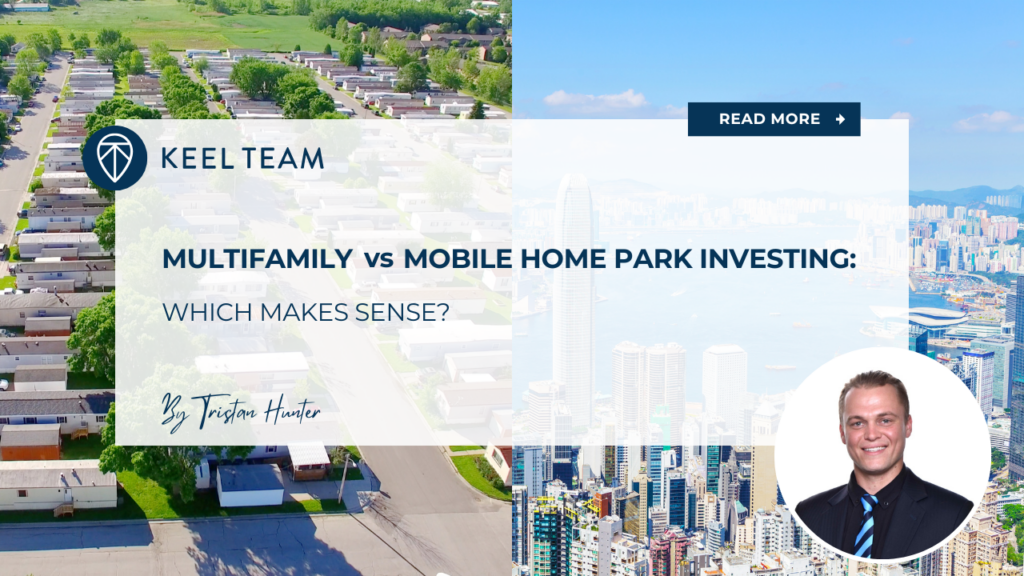Multifamily vs Mobile Home Park Investing: Which Makes Sense?
-
 Tristan Hunter - Investor Relations
Tristan Hunter - Investor Relations

Real estate investors often find themselves comparing mobile home park investing to multifamily properties. Each asset class offers unique benefits, but the right choice depends on several factors. In this post, we explore how mobile home parks stack up against multifamily real estate. We will look at tenant demographics, cash flow, financing options, and maintenance challenges to help you make an informed decision.
Tenant Demographics: Understanding Your Residents
Tenant demographics can shape the stability and performance of an investment. Multifamily properties typically attract a wide range of renters, including young professionals, families, and retirees. These tenants usually value proximity to urban amenities, which can contribute to turnover as their needs change. Multifamily properties also tend to see seasonal leasing cycles, requiring active marketing to maintain occupancy.
In contrast, mobile home parks cater to different demographics. Residents often include retirees, working-class families, and individuals seeking affordable, long-term housing. These tenants typically own their mobile homes, making them more likely to stay in one place. As a result, mobile home parks may experience lower turnover and more consistent occupancy rates compared to multifamily properties.
Cash Flow: Stability vs. Growth Potential
Cash flow plays a crucial role in evaluating the potential returns of any real estate investment. Multifamily properties often generate higher rental income per unit due to their urban locations and amenities. However, they may also experience greater vacancy rates, especially during market downturns or if tenants move to more affordable housing. Rent increases may also face restrictions depending on local regulations, which can affect profitability.
Mobile home parks, on the other hand, generally offer consistent cash flow with relatively lower vacancy rates. Since tenants usually own their homes, they only pay for the lot rent, making rent collections more reliable. Additionally, rent in mobile home parks tends to increase slowly over time, providing predictable growth. The combination of steady rent payments and low turnover can make mobile home parks an attractive option for investors seeking stable cash flow potential.
Download our FREE eBook on the Top 20 things to know BEFORE investing in mobile home parks!
Financing Options: Flexibility and Challenges
Financing options can vary between mobile home parks and multifamily properties. Multifamily investments often have access to traditional financing, including loans from banks, credit unions, and government-sponsored enterprises (GSEs) like Fannie Mae and Freddie Mac. These loans typically offer competitive interest rates and longer terms, making multifamily properties easier to finance for many investors.
Mobile home parks, however, may face more challenges when it comes to financing. Lenders often view them as specialized assets, which may limit access to traditional loans. That said, Agency lenders, some banks, and private lenders have started to recognize the potential of mobile home parks, expanding available financing options. Investors might also explore creative financing strategies such as seller financing, syndication, or portfolio loans to acquire mobile home parks.
Maintenance Challenges: Comparing Costs and Complexity
Maintenance requirements can significantly impact the profitability of an investment. Multifamily properties often demand higher maintenance budgets because owners are responsible for the upkeep of each unit. Property managers must address tenant requests, repair common areas, and manage building systems like plumbing and HVAC. This level of maintenance can become costly, especially in older properties or during tenant turnovers.
Mobile home parks, by contrast, typically require less intensive maintenance. Since most tenants own their homes, they handle most repairs within their units. Mobile home park owners are generally responsible only for common areas, infrastructure, and utility systems. This can reduce operating costs and simplify management, making mobile home parks more appealing to investors who prefer lower-maintenance assets.
Which Investment Makes More Sense?
When comparing mobile home park investing and multifamily properties, each option presents distinct advantages. Investors looking for higher growth potential might lean toward multifamily properties, especially in high-demand urban markets. However, these properties may require more active management and come with greater tenant turnover and maintenance costs. Generally speaking, they are also becoming saturated for those looking for value-add deals.
In contrast, mobile home parks could appeal to those seeking stable cash flow and lower maintenance demands. The tenant-owned model typically reduces the complexity of managing individual units, offering more of a passive investment experience. While financing can be more challenging, creative strategies may help overcome these barriers.
Conclusion
Ultimately, both mobile home park investing and multifamily properties can be profitable investments, depending on your strategy and goals. Multifamily properties generally offer higher rental income but may come with increased costs and turnover. Mobile home parks typically provide stable cash flow, fewer maintenance challenges, and reliable tenants. Each investment type requires careful consideration, making it important to align your choice with your risk tolerance and financial objectives.
Book a 1-on-1 consultation with Andrew Keel to discuss:
- A mobile home park deal review
- Due diligence questions
- How to raise capital from investors
- Mistakes to avoid, and more!
Disclaimer:
The information provided is for informational purposes only and is not investment advice or a guarantee of any kind. We do not guarantee profitability. Make investment decisions based on your own research and consult registered financial and legal professionals. We are not registered financial or legal professionals and do not provide personalized investment recommendations.

Tristan Hunter - Investor Relations
View The Previous or Next Post
Subscribe Below 👇





